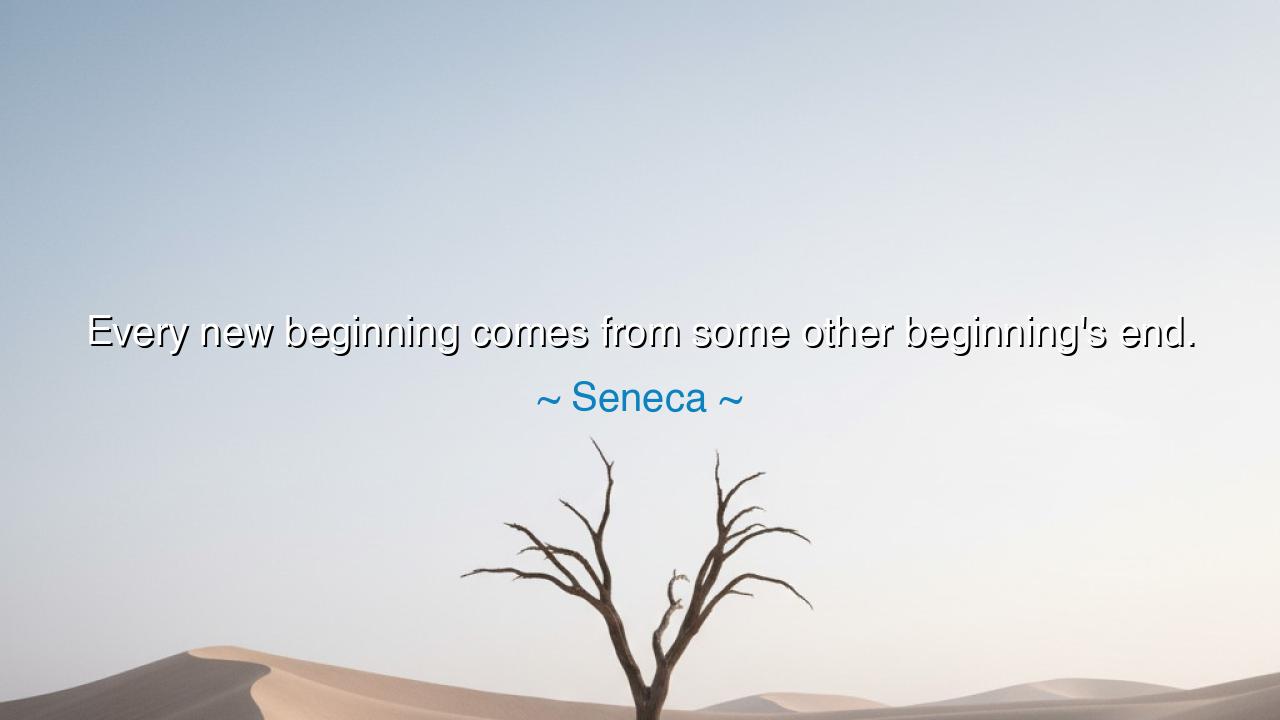
Every new beginning comes from some other beginning's end.






“Every new beginning comes from some other beginning’s end.” Thus wrote Seneca, the Stoic sage of Rome, whose words ripple through the ages like the sound of a bell tolling at both dawn and dusk. In this simple phrase lies a paradox as profound as the turning of the seasons: that what we call an end is never final, and what we call a beginning is never without roots. All life moves in cycles—birth follows death, hope rises from despair, and the falling of one leaf makes way for the bud of another.
To the unwise, an end appears as ruin, a cruel severing, a silence without song. But to those who see with the eyes of eternity, an end is but the threshold to another path. When one door closes, another stands ajar. The Stoics knew this truth well: the river of existence never stops its flow, though its banks may shift and its waters may change. To resist this current is to drown in grief; to accept it is to ride it into a new horizon.
Consider the fall of the mighty Roman Republic. For centuries it had stood as a bastion of law, order, and power. Yet corruption, ambition, and civil war brought it to an end. To many, this was a catastrophe, the death of Rome’s freedom. But from that end arose the Roman Empire, with Augustus at its helm—a new order that would endure for centuries, spreading Roman law, language, and culture to the farthest reaches of the known world. Thus, the Republic’s end was also the Empire’s beginning, a transformation both terrible and magnificent. Seneca himself, living under emperors, understood this cycle, and his words are a reflection of history’s relentless truth.
So too in the life of the individual. A love lost feels like a tomb, yet it may be the soil from which a greater love is born. A career ended may feel like exile, yet it may be the path that leads to a truer calling. The heart, when broken, believes it can no longer beat with joy. Yet often, it beats louder and fuller after sorrow has cleared away illusions. To cling to the end is to suffer; to embrace the new beginning hidden within it is to grow.
O children of time, understand this: the gods never take without giving. When they close one chapter, they place the pen in your hand to write the next. Do not curse the darkness of endings, for it is the womb of beginnings. The seed must die in the soil before the tree can rise. The sun must set before the dawn can blaze again. Thus, what you call an ending is but the turning of the page in the eternal book of life.
The lesson is plain: when you face an end, do not sink into despair, but ask yourself, “What new beginning waits beyond this?” Train your soul to see change not as loss, but as passage. Keep a journal of endings and beginnings, so that in the hour of sorrow you may remind yourself of past renewals. When a door closes, take one deliberate step forward, however small, toward the unknown path that has been opened.
Practically, let this guide you: when a chapter of your life closes, mark it with ritual—a spoken farewell, a written reflection, a moment of silence. Then, name aloud the new beginning that must come. This act transforms grief into resolve, confusion into clarity. By doing so, you align yourself with the rhythm of the cosmos itself, which is ever weaving ends into beginnings, beginnings into ends.
Thus, remember Seneca’s wisdom: Every new beginning comes from some other beginning’s end. Hold it as a torch in the darkness, and you will see that no night is without its dawn, no ending without its hidden seed of rebirth. For life is a circle, eternal and unbroken, and to walk its path with courage is the highest art of the soul.






AAdministratorAdministrator
Welcome, honored guests. Please leave a comment, we will respond soon